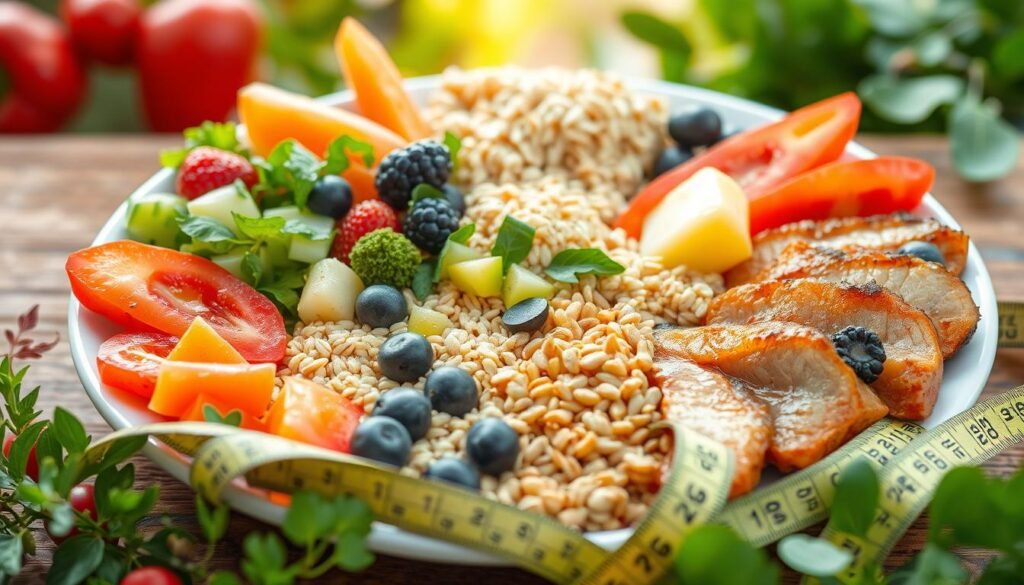Ever wondered why diets often don’t last long? Many people start weight loss journeys without a solid plan. It’s not just about eating less. It’s about making lasting changes through balanced eating and regular exercise.
Studies show that being active can cut heart disease risk by up to 35%1. Losing 10% of your body weight also brings health benefits, even if you’re still overweight1. So, a plan that combines diet and exercise is key for lasting health improvements.
This article will show you how to create a sustainable weight loss plan. We’ll cover realistic goals and strategies for a lasting lifestyle change, not just quick fixes.

Key Takeaways
- A sustainable weight loss plan requires a commitment to lifestyle changes, not just temporary diets.
- Combining diet changes with increased physical activity maximizes weight loss effectiveness.
- Setting realistic goals is crucial; aim to lose 1 to 2 pounds per week for lasting results.
- Regular physical activity aids in preventing weight regain and improving overall health.
- Pay attention to emotional triggers that may sabotage your weight loss efforts.
Understanding Sustainable Weight Loss
Sustainable weight loss is key for a healthy weight over time. It means making eating habits and lifestyle choices that last a lifetime. Quick weight loss plans often promise fast results but don’t last, leading to a cycle of gaining and losing weight.
The Importance of Sustainable Strategies
Experts say losing 1 to 2 pounds a week is safe and sustainable2. Eating well, like the Mayo Clinic Diet, helps manage weight and lowers disease risks3. Adding healthy habits like exercise, stress control, and good sleep boosts wellness and helps keep weight off4.
Short-Term vs Long-Term Weight Loss
Quick weight loss comes from strict diets. But lasting weight loss comes from slow, lasting lifestyle changes. Only 20% of those who are overweight keep the weight off long-term4. Choosing sustainable methods over quick fixes is vital for lasting health and avoiding weight gain.

Setting Realistic Weight Loss Goals
Setting realistic weight loss goals is key to managing your weight. Knowing what a healthy weight is for you is important. This often means checking your Body Mass Index (BMI) and looking at your past weight trends. The National Heart, Lung, and Blood Institute (NHLBI) recommends starting with a 5–10% weight loss goal5.
This goal helps you start on a path to losing weight effectively.
Defining Your Goal Weight
Your goal weight should be something you can keep up with. Studies show that slow weight loss, like 1–2 pounds a week, is best for keeping the weight off5. Aim to lose 4–8 pounds each month for steady progress5.
SMART Goals for Weight Management
SMART goals make your weight management plan better. For example, aiming to lose 12–24 pounds in three months is a clear goal5. This method helps you lose weight at a healthy pace and keeps you on track56.
After reaching a healthier weight, the NHLBI suggests moving to maintenance mode5. Regularly tracking your progress helps you see what works best. This keeps you motivated and on track.

The Role of Diet in Sustainable Weight Loss
Diet is key to losing weight and keeping it off. Eating a balanced diet boosts your metabolism and lets you enjoy healthy foods. Focus on whole foods like fruits, veggies, whole grains, and healthy fats. They help improve your health and support your weight loss goals.
Balanced Diet Principles
A balanced diet mixes different food groups for good nutrition and weight loss. Key points include:
- Eat lots of fruits and veggies for their nutrients and fiber.
- Choose whole grains over refined ones for more satiety and fewer calories.
- Add healthy fats from avocados, nuts, and olive oil to feel full and avoid overeating.
- Reduce added sugars and processed foods to avoid weight gain and health risks.
How Diet Affects Metabolic Rate
Diet and metabolic rate are closely linked for weight management. Eating more protein can increase your metabolism, helping you burn more calories. Also, eating high-fiber foods can control hunger, making it easier to stick to a weight loss diet.
Research shows that long-term diets like the Mediterranean or DASH diets improve health and lower obesity risks. This highlights the value of healthy eating habits74.
Choosing diets full of nutrients boosts your metabolic rate and helps keep weight off for good87.
Effective Diet Strategies for Weight Loss
Finding the right diet is key for lasting weight loss. Many diets offer health benefits and help you lose weight. The Mediterranean diet is great for your health, lowering disease risks and increasing life span. It’s also good for weight loss compared to low-fat diets9.
The DASH diet is another good choice. It helps control blood pressure and heart disease risks. It also aids in weight loss9.
Types of Diets that Support Long-Term Results
Many diets offer long-term benefits. Here are a few:
- Mediterranean Diet: Focuses on whole grains, healthy fats, and lean proteins. It supports weight loss and overall health.
- DASH Diet: Centers on whole foods. It aids in weight loss and lowers blood pressure.
- Plant-Based Diets: Includes vegetarian and vegan options. They reduce chronic disease risks and help with weight management9.
- Low-Carbohydrate Diets: Good for quick weight loss. But, make sure to balance nutrients.
Incorporating Healthy Fats and Fibers into Your Diet
Healthy fats and fiber are crucial for feeling full. Foods like avocados, nuts, and olive oil are full of healthy fats. They provide nutrients and help you feel full10.
Fiber from whole grains, vegetables, and fruits is also important. It helps with digestion and weight management. Low-calorie diets, with 1,000–1,500 calories a day, work well with these nutrients10.
Sustainable Weight Loss Plan: Building Healthy Eating Patterns
Creating healthy eating habits is key to any lasting weight loss plan. It’s about making good nutrition a fun part of your life, not a chore. Focus on a balanced diet filled with:
- Fruits and vegetables
- Whole grains
- Lean proteins
- Healthy fats
It’s important to control your portions to avoid overeating. Use measuring cups and pay attention to how much you eat. The Mayo Clinic Diet shows this works by letting you eat a variety of foods, like veggies and fruits, without limits3. It also lets you have desserts, but only 75 calories a day, for a healthy treat3.
Mindful eating helps you connect with your food. Eat slowly, without distractions, and enjoy every bite. This can make you feel full faster and eat less. Slow and steady weight loss, about 1 to 2 pounds a week, is often better than quick weight loss11.
Adding exercise to your routine can also boost your eating habits. Try to exercise for at least 30 minutes each day3. Putting these pieces together creates a weight loss plan that works well and helps you stay healthy for good.
Overcoming Barriers to Weight Loss
Weight loss is hard because of emotional and behavioral barriers. It’s key to know these barriers to weight loss for better weight management. Many face emotional eating due to stress, anxiety, or low self-esteem, making it tough to reach their goals. For example, emotional eating can cause overeating or bad food choices, messing up weight loss plans12.
Mental health issues like depression and anxiety also make it hard to stick to a healthy routine. This is important for successful weight management12.
Identifying Emotional and Behavioral Triggers
Knowing what triggers emotional eating is a big step. These triggers come from many places, like social pressure, how we see ourselves, and life stresses. To find these, we need to think about ourselves and keep a food journal. This helps us see when we eat because of emotions.
Strategies for Coping with Setbacks
Using good coping strategies helps beat setbacks in weight loss. Here are some ways to do it:
- Get support from groups or experts to share and get motivated.
- Do regular exercise to handle stress and feel better.
- Try mindfulness or meditation to be more aware and eat less emotionally.
- Set goals that are realistic and achievable to avoid getting discouraged.
- Plan and prep meals to avoid bad choices when we’re short on time.
By knowing what triggers emotional eating and using these strategies, we can handle weight loss challenges better. This leads to lasting weight management success13.
Incorporating Physical Activity into Your Weight Loss Plan
Adding physical activity to your weight loss plan is key for lasting results. Exercise helps create a calorie deficit and boosts mood and metabolism. It also makes weight loss more likely when you eat right14.
Doing fun activities makes sticking to exercise easier. This leads to long-term success in losing weight14.
Benefits of Regular Exercise
Regular exercise is great for health and weight control. It reduces hunger, helping you eat fewer calories. This is important for losing weight and keeping it off14.
High-intensity workouts raise your metabolism for hours. This means you burn more calories, even when you’re not moving14.
For big weight loss goals, mix up your exercise. Include:
- Aerobic workouts that increase heart rate
- Strength training to preserve lean muscle mass
- Flexibility exercises to enhance overall physical capability
Try to do at least 150 minutes of moderate-intensity aerobic exercise each week. This is key for losing weight14.
Finding Enjoyable Physical Activities
Finding fun physical activities is crucial. Dancing, hiking, or team sports make exercise enjoyable. They turn it into a fun part of your day.
The National Weight Control Registry found that 94% of successful losers exercised15. Choosing activities you love boosts your motivation. This makes your weight loss plan more effective and lasting14.
Maintaining Weight Loss: Strategies for Success
After losing weight, the next step is to keep it off. Success comes from being consistent and always checking progress. It’s key to add healthy habits to your daily life for lasting weight control.
The Importance of Consistency
Being consistent is crucial for keeping weight off. People who keep their weight down stick to their diet and exercise plans. They make sure to stay active and eat healthily.
Research shows that 94% of those in the National Weight Control Registry increased their activity to manage their weight16. Also, following a weight maintenance program helps prevent weight gain17.
Monitoring Progress and Making Adjustments
Tracking your progress is key to managing your weight. By monitoring your weight, body measurements, and diet, you can make needed changes. It’s normal to hit a plateau, even with a strict diet18.
Regularly reviewing your diet and exercise helps you make adjustments. This can help you get past plateaus.
Setting achievable goals and having a supportive environment helps stick to your weight management plan. It’s important to balance your calorie intake with how much you burn. Making small changes and staying focused on your diet helps keep the weight off.
The Psychological Aspect of Weight Loss
Weight management is not just about physical changes. It also involves important psychological factors. Understanding the role of a positive mindset and support systems is key to lasting weight loss success.
Cultivating a Positive Mindset
Having a positive mindset is crucial for successful weight loss. People who are optimistic can better handle setbacks. Long-term weight loss is tough; studies show that over 50% of lost weight is regained after two years, and more than 80% after five19.
This highlights the need for mental strategies like setting goals and reflecting on progress. These help keep motivation high.
The Impact of Support Systems
Support systems are vital for effective weight management. Having friends, family, or professionals to support you can keep you on track. Social support boosts weight loss efforts and makes the journey better19.
When faced with challenges, knowing you’re not alone helps emotionally. This is crucial since 75% of Australians turn to emotional eating to cope with stress19. Using support can greatly improve sticking to healthy habits and learning from each other’s experiences fosters a strong, positive mindset.
Maintaining a Healthy Lifestyle Beyond Weight Loss
Keeping a healthy lifestyle is key to keeping weight off after you lose it. It’s important to eat right and stay active to keep your weight in check. Sadly, most people gain back half of the weight they lost within two years20. This shows how vital it is to keep up good eating and living habits.
It’s not just about losing weight. It’s about making healthy choices that last. Learning to read nutrition labels is a big part of this.
Creating Healthy Habits for Life
Building healthy habits is the first step to lasting success. Important habits include:
- Setting regular meal times
- Engaging in consistent physical activity
- Staying hydrated
- Practicing effective stress management
Studies show that these habits help keep weight off and improve your health21. Starting small can help you stick to healthy habits for a long time.
Understanding Nutrition Labels
Knowing how to read nutrition labels helps you make better food choices. It lets you control how many calories you eat and what nutrients you get. Since most of what we eat in America is processed, understanding labels is crucial to avoid weight gain20.
Look for:
- Serving sizes
- Caloric content
- Levels of sugars, fats, and sodium
- Presence of artificial ingredients
Learning this helps you pick healthier foods and keep a healthy lifestyle.
Nutrition Education and Resources
Improving your health starts with nutrition education. Working with dietitians and nutritionists is key. They offer insights and guidance for your weight loss plan.
Learning from Dietitians and Nutritionists
Dietitians and nutritionists provide tailored weight loss resources. They ensure your diet is safe and effective. They use tools like the Hunger Scale for Healthier Habits to help manage food intake22.
They suggest structured programs with community support. This is important for keeping up with lifestyle changes. They also recommend different diets to meet everyone’s needs22.
Learning from the CDC can help understand obesity rates. Over 42% of U.S. adults are affected23.
Online platforms and local groups offer many weight loss resources. They focus on personalization for your diet. By seeking knowledge from trusted sources, you can manage your nutrition and lose weight effectively2223.
Conclusion
A sustainable weight loss plan starts with healthy eating and regular exercise. It also needs mental strength and ongoing learning. Setting goals like losing 1-2 pounds a week is key for lasting success2425.
Creating a calorie deficit of 500 to 1000 calories helps a lot. This can be done by eating less and exercising more24.
Doing at least 150 minutes of moderate exercise a week boosts weight loss and health26. Getting 7-9 hours of sleep and drinking enough water are also crucial. They help control hunger and support weight loss2425.
Changing habits takes time, but with these strategies, you can start a successful weight loss journey. It’s not just about losing weight; it’s about living a healthier lifestyle26.
Looking back at the weight loss strategies discussed, we see how to keep moving forward. Being flexible and adaptable is key in overcoming life’s obstacles26.
FAQ
What is a sustainable weight loss plan?
A sustainable weight loss plan is about making slow changes in your life. It focuses on eating well and staying active. This way, you can keep the weight off for good.
How can I set realistic weight loss goals?
To set realistic goals, first figure out what a healthy weight is for you. Look at your Body Mass Index (BMI). Then, aim to lose 1 to 2 pounds a week. This is a safe and steady pace.
Why is diet important for weight loss?
Diet is key for losing weight because it gives you the nutrients you need. Eating whole foods helps control hunger and boosts your metabolism. This helps you lose fat for the long haul.
What types of diets are effective for long-term weight loss?
Good diets for losing weight include plant-based, Mediterranean, and intermittent fasting. These diets help you eat healthily. They also make sure you get all the nutrients you need.
How can I overcome emotional eating triggers?
To beat emotional eating, first know when you’re doing it. Then, find ways to deal with it. Try journaling, exercise, or talking to friends or experts.
What role does physical activity play in weight management?
Exercise is crucial for losing and keeping off weight. It makes you feel better, speeds up your metabolism, and helps you stick to healthy habits.
How can I maintain my weight loss after reaching my goals?
To keep the weight off, keep eating well and exercising. Watch your progress and adjust your plan as needed. This helps you avoid gaining back the weight.
What psychological factors affect weight loss success?
Things like your mindset and support from others really matter. Having a positive attitude and a strong support system helps you stay on track.
How do I create healthy habits for life?
To make healthy habits last, start by adding nutritious foods to your meals. Learn to read nutrition labels and make choices that help you stay healthy.
Where can I find reliable nutrition education sources?
For good nutrition advice, talk to registered dietitians or nutritionists. Also, check out trusted websites and resources that offer solid info on eating well and losing weight.



